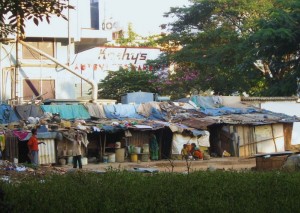UN’s Navi Pillay Takes On Caste Discrimination
 The United Nations high commissioner for human rights, Navi Pillay, has issued a strong and eloquent call on the world to end caste discrimination like it did apartheid and slavery. The organizations Human Rights Watch, the National Campaign On Dalit Human Rights, and the International Dalit Solidarity Network have all endorsed Pillay’s and the UN’s initiative on the issue.
The United Nations high commissioner for human rights, Navi Pillay, has issued a strong and eloquent call on the world to end caste discrimination like it did apartheid and slavery. The organizations Human Rights Watch, the National Campaign On Dalit Human Rights, and the International Dalit Solidarity Network have all endorsed Pillay’s and the UN’s initiative on the issue.
The caste system and the human rights abuses going with it affects as many as 260 million persons worldwide. It is prevalent in India, Nepal, Bangladesh, Pakistan, but also in parts of Africa with a strong Indian diaspora. Dalits and similarly discriminated against communities across the globe have been oppressed for thousand of years. Dalits used to be called “untouchables”, and even if the upper castes are embarrassed to use the word; they still view Dalits as inferior human beings. Even today, in no case the marriage of a son of a Brahman( India’s upper caste) with the daughter of a Dalit would meet family’s approval. India has an official ban on caste discrimination, but it will not be effective unless it becomes a top priority for the government to enforce it.
Recently Nepal has expressed support for the United Nations guideline for the effective elimination of caste discrimination globally. The following paragraph of the guideline define what they consider to be discrimination.
“Discrimination based on work and descent is any distinction, exclusion, restriction, or preference based on inherited status such as caste, including present or ancestral occupation, family, community or social origin, name, birth place, place of residence, dialect and accent that has the purpose or effect of nullifying or impairing the recognition, enjoyment, oer exercise, on an equal footing of human rights and fundamental freedoms in the political, economic, social, cultural, or any other fields of public life. This type of discrimination is typically associated with the notion of purity and pollution, and practice of “untouchability”, and is deeply rooted in societies and cultures where the discrimination is practiced.”
In her opinion piece, Navi Pillay states that the time has come to eradicate the shameful concept of caste, and she calls on the international community to come together as it did when it helped put an end to apartheid. Navi Pillay grew up in South Africa, and when she talks about discrimination and apartheid she knows first hand what she is talking about.
“As a woman of color from a racial minority growing up in apartheid South Africa, I know a thing or two about discrimination. “Untouchability” is a social phenomenon affecting approximately 260 million persons worldwide. This type of discrimination is typically associated with the notions of ritual purity and pollution which are deeply rooted in different societies and cultures. The problem is neither confined to one geographical area or exclusively practiced within one particular religion or belief system. It is a global phenomenon. Caste is the very negation of the human rights principles of equality and non discrimination. It condemns individuals from birth, and their communities, to a life of exploitation, violence, social exclusion and segregation,” writes Navi Pillay.
Unfortunately, Navi Pillay’s call for action will meet a wide resistance, just like the civil rights movement did in the United States in the late 1960’s. Meanwhile, the international community must put some real pressure on countries such as India to seriously address the matter of caste discrimination. So far, India has not truly tackled the problem but instead has paid lip service to the international community.
“The time has come to eradicate the shameful concept of caste. Other seemingly insurmountable walls, such as slavery and apartheid, have been dismantled in the past. We can and must tear down the barriers of caste too,” concludes Navi Pillay in her inspiring opinion piece. Let’s hope her call is heard.
To read Navi Pillay’s article click here. To read the UN guideline for the effective elimination of caste discrimination globally click here.
Related Articles













You must be logged in to post a comment Login